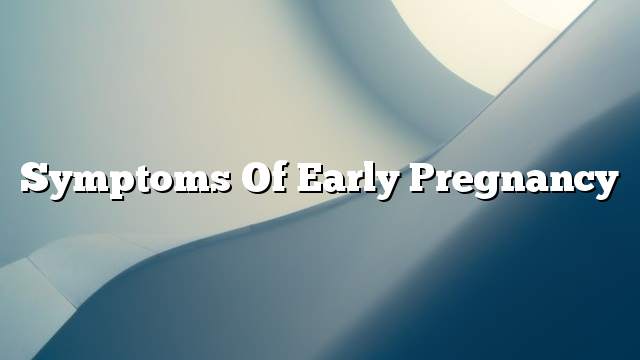Pregnancy
Pregnancy is used to describe the woman’s pregnancy of the fertilized egg in her womb. During this period, the fertilized egg grows and is integrated into the embryo. This period starts from the last menstruation of the woman to her birth, and is about 40 weeks, or just over nine Months.
The gestation period is divided into three or three stages. At each stage of pregnancy, many hormonal and physiological changes occur in the body of the pregnant woman, and every third lasts between twelve and fourteen weeks, about three months. The importance of pregnant women’s awareness of the hormonal changes that occur in their body every third is to take caution and to face the factors that pose a risk of pregnancy at every stage, as well as to perform the required tests as suggested by the specialist doctor.
Pregnancy symptoms
Symptoms of pregnancy vary from woman to woman. Pregnant women do not experience the same symptoms, and women themselves do not suffer the same symptoms from one pregnancy to another. It should be noted that women may suffer from symptoms and signs similar to pregnancy and some diseases; so pregnant women must understand the symptoms of pregnancy.
Pregnancy symptoms may occur during the first week of pregnancy and may occur only after several weeks of pregnancy. It is worth noting that all symptoms are not necessary; some may appear and others do not. The doctor should be consulted when the symptoms worsen and lose their ability to be tolerated.
Symptoms of early pregnancy
Symptoms of early pregnancy include:
- Absence of menstruation: (Missed Period) The most common early pregnancy symptom is evident, and this may be what drives women who expect pregnancy to take a pregnancy test. But there are many cases in which menstruation is absent, such as loss of weight or gain, fatigue and stress, and some hormonal imbalances, as well as when women stop taking birth control pills. It is important to note that the descent of blood is possible during pregnancy, but it requires consultation with a specialist to assess whether it is normal or requires emergency health care.
- Morning sickness: (Morning Sickness) Perhaps one of the most common symptoms of pregnancy pregnant woman feeling nausea, especially in the morning; so called morning sickness. Although there is no underlying cause, it can be explained by hormonal and physiological changes occurring during pregnancy. It should be noted that this offer does not appear in all pregnant women. It is related to this offer change the desire of the pregnant women to food and drink; it is interested in certain types and alienation from others. But all symptoms associated with nausea decrease when women enter the thirteenth or fourteenth week of pregnancy. In general, the pregnant woman should take a healthy diet to maintain the health and health of the fetus during pregnancy, thus ensuring both a healthy and balanced diet.
- Dizziness and Fainting: Dizziness and fainting can be attributed to vasodilation, low blood sugar, and low blood pressure.
- Drops of blood (Spotting) and abdominal cramps (Cramping): After fertilization of the egg by the sperm, the fertilized egg attaches to the wall of the uterus. As a result of this adhesion, blood drops from the vagina may be removed in a process called implantation bleeding, often six to twelve days after fertilization of the egg. Blood may accompany abdominal cramps, which are very similar to those occurring at the time of menstruation. But if we want to compare blood loss from the vagina and abdominal cramps at the time of menstruation and pregnancy, there is no doubt that these symptoms are less severe at pregnancy. It is important to note that pregnant women may notice the descent of milky white fluid from her vagina due to increased thickness of the wall of the vagina after pregnancy, and may continue these secretions throughout pregnancy, but does not require treatment and does not pose a risk as long as it does not smell unpleasant or accompanied by heartburn or itching, If accompanied by any of the previous symptoms must be reviewed by the doctor for the possibility of an infection of fungal or bacterial.
- Changes in breast: Breast changes occur in the first stages of pregnancy. Women notice bulging their breasts and heaviness, and may experience mild pain. The area of the aura around the nipple becomes darker. These changes are due to a change in the level of hormones in the body. Although these symptoms appear after one to two weeks of pregnancy, they gradually disappear during pregnancy.
- Feeling tired: (Due to high levels of progesterone), low blood sugar, low blood pressure, and increased blood production during pregnancy, women can feel very tired and tired, especially after the first week of pregnancy; Therefore, women are advised to take a good deal of rest and eat foods rich in protein and iron.
- Mood Swings: (Mood swings) and occurs due to hormonal changes resulting from pregnancy; pregnant women can suffer mood swings especially during the first three months.
- Headache: (Headaches) A pregnant woman can suffer from frequent headaches.
- frequent urination: (Frequent urination). Many women suffer from this symptom, and start about the sixth or eighth week after pregnancy, and occurs in pregnancy because of hormonal changes. It is worth mentioning that there are many reasons for frequent urination such as; urinary tract infection, diabetes, the use of diuretics and others.
- Constipation: Constipation occurs because of increased progesterone during pregnancy, so food passage through the intestine becomes slower, leading to constipation. To relieve constipation, pregnant women are advised to eat high fiber foods, drink plenty of water and exercise.
- Back pain: Pregnant women can suffer from chronic back pain.
